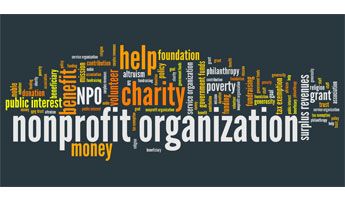Uncategorised
ELITE NONPROFIT SURVEY

We value our communities and the work that you as nonprofits are doing. We want to see you flourish in your mission, and so we asked you what do you need to do so? You can see how you responded in the link below.
What types of data should we track?
WHY IS DATA SO IMPORTANT?

In short, data tells your story. It speaks to your past, present, and future. Not only those, but your successes, failures, and the path in between. It has the ability to be your biggest advocate when used correctly, like an ace in your pocket.
Data improves decision-making. With data, you can get a pulse on where you are at and where you need to go. When you use it well, it creates trust and credibility. When you cultivate trust and credibility, you retain, regain, and find new donors.
According to a 2014 study conducted by NTEN, 75% of nonprofits collect data to report back to funders, while another 75% said they do it for program evaluation purposes, which is often a funding requirement or a way to attract new funding. Seventy-one percent of funders now require some element of outcomes reporting, and 39% of nonprofits experienced an increase in requested measurements from funders (Nonprofit Finance Fund, 2015).
The trend of more funders requiring outcomes and output measurements is anticipated to steadily increase. Funders, both foundations and donors, want to give to reputable organizations that will not waste their money. Foundations, in particular, are focused on impact and effectiveness, so they are looking for those who are forward-thinking in their approaches and who provide more information with regards to their activities and outreach (Hope Consulting, 2011).
You may be fine right now with doing what you are doing (although with no true sense whether or not you are making a difference), but if growth and foundation or federal funding is in your plan, you will need to strongly consider implementing an outcomes (proof of effectiveness) framework now.
WHAT TYPES OF DATA CAN NONPROFITS TRACK?
Within the nonprofit realm, there are generally four categories of data that must be considered. Not everything listed are initial must-haves, but they are all data points that will help you. Although it is difficult to obtain for the last bucket, be sure to include demographic information when you start collecting data.
-
Operations. We are going to go ahead and assume that you, as a nonprofit, are already collecting the necessary data related to your internal and financial operations as required by the IRS. But in addition to these things, you may want to consider:
- Volunteer hours
- Staff training hours
-
Outreach.Outreach data refers to the data around your fundraising, communications, and marketing. Because nonprofits are reliant on donations, collecting data around your donors is vital.
- Donor growth, year over year
- Donation growth
- Average gift size growth
- Donor retention rate
- Pledge fulfillment percentage
- Recurring gift percentage
- Return on investment
- Online gift percentage
- Events (donor signups after)
- Attrition rate
- Gains/losses
- Donor lifetime value
- Transaction frequency
- Donor satisfaction/commitment/trust
- Exit polling
- Number/category of complaints
- Facebook ‘likes’
- Retweets
- Bounce rates
- Page views (social media pages as well as website)
- Page shares
- Thank you pages
- Downloadable resources
- Newsletter sign-ups
- Event attendance
- Website optimization
- Landing pages that lead to the most conversions
- Traffic sources that lead to the most conversions
- Pages with the highest exit rate
Donor loyalty can be measured by looking at:
Because we live in an online-world, nonprofits need to monitor their presence and lure online.
Website data can be measured by looking at:
-
Program.Because nonprofits are specifically tasked with social impact, mission effectiveness or fulfillment is a critical area where data should be collected. Nonprofits achieve their mission through the various programs they run, so collecting data around program successes and failures is imperative. Where possible, include a good amount of demographic information with your measurement instruments, so that analysis can help you learn more about your population, as well as project trends.
- Number of people served
- Program deliverables and their dollar value
- Outcomes
- Outside.External data is the data that falls outside of the nonprofit, but is helpful to its function. This data may include data from the government (local, federal, etc.) or topic-specific data provided by research groups.
A QUICK WORD ABOUT DATA MANAGEMENT…
You will want to find a data management system to help you store, track, and organize your data. For outreach data management (fundraising and online presence), there are different kinds of software available. Much of them do the same thing, but their formatting and function differs.
Spend some time filtering through them to find out what works for your nonprofit culture.
Things to think about:
WHAT DO OTHER NONPROFITS TRACK?
According to the State of Nonprofit Data report (NTEN, 2012):
WHAT CHALLENGES MAY WE FACE?
With respect to the most challenges cited by nonprofits in the use and application of data are (NTEN, 2012):
Not listed here but undoubtedly a factor, are the data and reporting requirements set by funders. Sometimes, these requirements can become tedious and may interfere with the actual work of your nonprofit, but they can also be the very thing that puts the right tracking elements in place for you. If you are interesting in growing, you will have to seek out new funding sources, but in doing so, new expectations are brought in.
No doubt, starting down the data road will have its challenges. Trying to navigate the waters without any training or background could feel intimidating and potentially cause a stalemate. Though it cost you something upfront, it is highly suggested to work with expert consultants to figure out your plan, determine your starting points, obtain training, and have a soundboard for troubleshooting. This will not always be the case, but it’s a good practice for starting off on the right foot. In doing so, you also put your stakeholders’ minds at rest, as they 1) can get a grasp of what to expect of the next time period and 2) see you are taking this step seriously.
CAN YOU COLLECT TOO MUCH DATA?
Absolutely. If there is no real intention to use the data to make decisions, you’ve collected too much. Honestly, if there’s no intention to use data, you really shouldn’t even bother. In reality, it is a balancing act of how much data to capture, so you need to identify what is important to you and then put something in place to track it. Don’t get caught in the trap of “it would be interesting or nice to know…”
WHAT DO WE DO NOW
Step back and consider what your 5 and 10 year organization growth goals are and then:- As an organization, decide what you want to know. Ask specific questions. Make sure everything is aligned with your mission.
- Identify the kinds of data that may help you get to your growth goals – is it donor or program data (or a mix of both)?
- Work with an expert on building your data plan. Be sure that this individual/group has your best interest at heart. If they don’t listen or can’t understand your dynamics, find another one. If they don’t or can’t break things down into palatable steps, find another one. You need an advocate.
- Get your team on board by helping them understand how it will help them.
- Look at your low-hanging fruit, and start there. You don’t always have to start with outcomes.
- Document your process in easy-to-understand terms and steps, so that it is replicable.
- Build a plan for how to integrate more data tracking.
- Celebrate the small wins across your organization. Show your successes.
Understand that data must be used over time (you can’t just measure once) in order to use it well.
Sources
From “A Few Good Tools: Low Cost Consistuent Databases,” IdealWare, URL: http://www.idealware.org/articles/fgt_low_cost_dbs.php
From “Collected Voices: Data-Informed Nonprofits,” NTEN, URL: http://www.nten.org/article/collected-voices-data-informed-nonprofits/
From “Money For Good II: Driving Dollars to the Highest-Performing Nonprofits,” Hope Consulting, URL: http://www.guidestar.org/ViewCmsFile.aspx?ContentID=4038
From “State of the Sector Survey,” Nonprofit Finance Fund 2015, URL: http://survey.nonprofitfinancefund.org/
From “State of Nonprofit Data, 2012,” NTEN, URL: http://www.nten.org/article/the-2012-state-of-nonprofit-data-report/
From “Quick-Start Guide to Data Success for Nonprofits,” Network for Good, URL: http://www.networkforgood.com/nonprofitblog/quick-start-guide-data-success-nonprofits/
From “The Data Every Nonprofit Should Be Tracking,” NonprofitHub. Url: http://nonprofithub.org/nonprofit-technology/the-data-every-nonprofit-should-be-tracking/
From “Website Data Nonprofits Should Track,” Wired Impact, URL: http://wiredimpact.com/blog/website-data-nonprofits-should-track/
From “3 Kinds of Data That Actually Matter to Nonprofits,” NonprofitHub. Url: http://nonprofithub.org/nonprofit-marketing-plan/best-ways-for-nonprofits-to-use-data/
From “7 Donor Loyalty Metrics Every Nonprofit Should Track,” Bloomerang Company Blog, URL: https://bloomerang.co/blog/7-donor-loyalty-metrics-every-nonprofit-should-track/
From “9 Key Performance Indicators Every Nonprofit Should Be Tracking,” Top Nonprofits, URL: https://topnonprofits.com/9-key-performance-indicators-every-nonprofit-should-be-tracking/
How a Nonprofit and State Department Partnership Accomplished a Statewide Gambling Prevalence Study with the Help of Elite Research
Elite Research helped us conduct a valid and much needed study about a very real public health issue in our state. The team was able to understand our objectives and ultimate goal, and did the necessary research to build a survey that incorporated established diagnostic tools. Having these results will help us be able to go after federal funding and support to help intervene in the lives of those in our state who need help.
Wiley Harwell, Executive Director, OAPCG
In 2015, Elite Research began working with the Oklahoma Association of Problem and Compulsive Gaming (OAPCG), in partnership with the Oklahoma Department of Mental Health and Substance Abuse (ODMHSAS) to undertake a statewide study on the prevalence of compulsive gambling in order to best serve the behavioral and rehabilitative needs of the residents of the state of Oklahoma. To date, no such prevalence study has been conducted in the state of Oklahoma. Conducting such a study would assist the OAPCG in lobbying for additional funds and intervention resources on behalf of its residents.
According to national diagnostics, up to 1.5% of the general population in the United States is speculated to have pathological gambling problem. Within the state of Oklahoma, there are over one hundred casinos. Because no prevalence studies have been conducted in Oklahoma to date, applying the national percentage to the state’s population, it is estimated that close to 60,000 residents suffer from compulsive or problem gaming. Individuals with this condition have been found to also suffer from substance use, mood, anxiety, and personality disorders. Because pathological and problem gaming is associated with coexisting psychiatric problems and due to the concentration of casino-gaming within the state, it is considered a critical public health need. Therefore, it was crucial to understand the prevalence of this issue in the state of Oklahoma.
Once the goals and parameters of the OAPCG were clearly outlined, Elite Research began this study with a critical review of the literature and instruments available. As the field of gambling has a large body of research available, we were able to identify pre-existing, validated surveys that we could draw portions from in order to create a survey that best addressed OAPCG’s needs. Several rounds of feedback between OAPCG and Elite Research were conducted until we had an agreed upon instrument.
Once the survey was designed and tested in a pilot study, it was officially launched in a three-way methodology – through social media, telephone interviews, and online panels. By conducting a three-way approach, statistical comparisons between each form was possible. Elite Research worked with OAPCG to keep the costs down on data collection with online survey options, mail invitations, and a slower interview approach.
OAPCG Methodology
- Minimum required sample of 2200
- Final valid sample of 2636
- Sample represented demographics from U.S. census data
- 3 forms of participant recruitment
- Telephone ABS survey
- Social media survey
- Online panel survey
After the data had been collected, cleaned, and analyzed, Elite Research created a report detailing the frequencies of responses by recruitment type and scoring for diagnostic categories (borrowed instruments such as the DSM-IV, DSM-5, Problem and Pathological Gaming Measure within the OAPCG instrument).
In this particular case, no high level analysis was conducted as a means to keep the costs down. OAPCG requested all data files in order to work with local university graduate students to run higher-level analysis with Elite Research as oversight.
The key factors for the client on this project were low cost and quality. Because of the ample amount of research available on the topic of compulsive gambling, we knew there were sources available to help us build a unique survey that met the client’s needs. The report was intended to be shared with the Oklahoma state department and the national chapter on problem and compulsive gambling, so quality was imperative. The client understood and was willing to patiently endure a longer data collection period in order to keep the costs lower.
About the Oklahoma Association of Problem and Compulsive Gaming (OAPCG).
The OAPCG is a non-profit dedicated to providing education and training regarding problem and compulsive gambling, increase public awareness within the state of Oklahoma about problems associated with problem and compulsive gambling, providing information about compulsive gambling to all concerned individuals, conducting research in areas related to this problem, and developing prevention and education programs for all Oklahoma residents. It is with this mission that the OAPCG is requesting a study of compulsive and problem gaming within their state in order to best serve the needs of their residents, supporting a greater public well-being.
About the Oklahoma Department of Mental Health and Substance Abuse (ODMHSAS).
The ODMHSAS is responsible for providing services to Oklahomans who are affected by mental illness and substance abuse. In FY13, ODMHSAS provided services to approximately 187,000 individuals. Fewer than 5 percent require hospital care. The majority takes part in mental health and substance abuse outpatient programs, targeted community based services, prevention efforts and educational initiatives.
About Elite Research, LLC.
Elite Research, LLC is a research and statistical consulting firm based out of Dallas, Texas. This woman-owned small business provides expert support to academic researchers, government entities, nonprofits, researchers in the private sector and corporations in all facets of the research process, including the sampling, design, collection, analysis, reporting, implementation and optimization of findings. Over thirty consultants and staff provide expertise in research design, programming, analysis, data management, survey development, sampling methodologies, web-based surveys, data collection plans, technical writing, and statistical analysis. Fostering an environment of research development, training, and collaboration, our ambition is to ensure that both research and statistics are easily approachable by everyday researchers around the world.
Our Nonprofit HomepageOur Nonprofit Services Our Nonprofit White papers
How Samaritan’s Purse Accomplished an Internal Program Evaluation
with the Help of Elite Research.
Elite Research, from the very beginning, has been a valuable partner and resource for our Program Evaluation project. They provided the expertise, academic resources and technical support necessary. In a non-technical environment, they speak our language.
Michael Cardy, Strategic Initiatives Manager Samaritan’s Purse, Operation Christmas Child
In 2014, Elite Research began working with Samaritan’s Purse’s (SP) to conduct an internal study of their Operation Christmas Child (SP-OCC) program, a follow-up faith-based program. Their desire was to evaluate the immediate, as well as the long-term impact of the program, and requested the evaluation include both quantitative and qualitative approaches. Conducting such a study would assist Samaritan’s Purse in understanding the global impact of its SP-OCC program upon its participants, as well as their teachers, communities, and churches. It was intended that this study become a benchmark for future evaluations.
With the evaluation goals of assessing program impact on content comprehension, behavioral change, and transformation (child, teachers, community, and churches), Elite Research worked with SP-OCC leadership to develop a survey instrument that considered program materials and delivery as its foundation and a thorough methodology that could be easily replicated. The methodology included an international pilot project that tested the survey and procedures in four distinct (but representative) countries, using a pre-test/post-test design with control and experimental groups. The pilot study allowed for testing of comprehension, language, data entry and preliminary analysis, along with initial scoring to identify any problems with questions. Towards the end of this 6 month pilot phase, an international SP-OCC team was trained in the necessary procedures to roll out the global study (in 3 countries in 2014 and 4 countries in 2015). Additionally, a scoring index was created based on the construct of questions, which would allow for a very quick score on a spirituality scale. This scale provided a more efficient benchmark assessment, as instead of evaluating specific questions, it could evaluate specific constructs or categories of thought.
Once the quantitative pilot study was well on its way, the qualitative study began. Its particular focus was to gain a rich perspective from participants, teachers, community members, and church leaders regarding the effectiveness of the program. Focus groups and interviews were used to gain in-depth data to answer key questions posed by Samaritan’s Purse. Elite Research worked with SP-OCC leadership to develop key questions and the focus group design (groups, format, facilitation scripts, data analysis training, and reporting). As part of this phase, 21 focus groups were conducted in 4 countries.
Having both quantitative and qualitative data enabled Samaritan’s Purse to have a comprehensive picture of the impact of the SP-OCC program. As a result of this program evaluation, Samaritan’s Purse has been able to…
SP-OCC Methodology
- Mixed method design
- Minimum required quantitative sample of 500 per country
- Pre-test/post-test
- Control/experimental groups
- Minimum required qualitative sample of 64 per country
- Children
- Teachers
- Community leaders
- Church leaders
- Train-the-trainers
The key things for the client on this project were low cost and embedding skills into their teams to be able to replicate future studies. Additionally, Samaritan’s Purse’s strict data privacy requirements, did not allow data to be handled outside of their offices; Elite Research worked with this stipulations by providing step-by-step, detailed procedures for data collection and analysis, and by providing 2-day onsite analysis training and oversight key analysis steps.
About Samaritan’s Purse.
Samaritan’s Purse (www.samaritanspurse.org) is a nondenominational evangelical Christian organization providing spiritual and physical aid to hurting people around the world. Since 1970, Samaritan’s Purse has helped meet needs of people who are victims of war, poverty, natural disasters, disease, and famine with the purpose of sharing God’s love through His Son, Jesus Christ. The organization serves the church worldwide to promote the Gospel of the Lord Jesus Christ.
About Elite Research, LLC.
Elite Research, LLC is a woman-owned, small business providing research and statistical consulting with headquarters based out of Dallas, Texas. As a global provider of research and statistical consulting, we provide expert support to academic researchers, government entities, nonprofit organizations, researchers in the private sector, and corporations in all facets of the research process, including the sampling, research design, data collection, analysis, reporting, and implementation and optimization of findings. With over thirty consultants from a wide spectrum of professional and academic backgrounds, Elite Research has the ability to cater to almost any research or statistical need. Our ambition is to ensure that both research and statistics are easily approachable by everyday researchers globally.
Our Nonprofit HomepageOur Nonprofit Services Our Nonprofit White papers

Our Value
Our communities are important to us, which is why we value your nonprofit’s role in society and the work that you do. We believe we can help increase your nonprofit’s effectiveness in achieving its goals by empowering your teams with the appropriate tools necessary to achieve your mission. But beyond that, we want to empower your team with new skills, abilities, and ways of thinking that will take your work much further than where it is right now. We are committed to working with you where you are, and will not try to get you to take on more than you can handle or need. We are here for you, and we believe that you will find Elite to be one of your greatest advocates.
Our Clients
As the saying goes, “the proof is in the pudding.” Our clients have ranged from national networks to grassroots community development organizations and international, faith-based nonprofits; regardless of type, size, or mission, they consistently return to our services. Whether it is for instrument development, community needs assessments, program evaluations, advanced statistical analysis, research design, or general project oversight, we inevitably hear, “I wish we had found you sooner.” Even after their projects end, clients will contact us to screen ideas and get our feedback. Our clients realize that we are on their team, we value education as part of the process, and we understand that collaborative relationships are key to any success.


Our Experience
The experience we offer is unique. Our team has over 30 graduate-level consultants with Master’s and PhD degrees, and they come from a variety of cultural, educational, and professional backgrounds. The broad range of knowledge and experience allows for cross-reference on our projects. This gives the client a customizable package of services to meet their specific needs. Our team members have been a part of numerous domestic and international projects and studies, many of which have been published in peer-reviewed journals. Several of our consultants have also taught, or currently teach, at the university and graduate level.
Our Process
We understand that every nonprofit differs in need and experience. Some may just be starting down the research and evaluation road, while others may have research experience well under their belts but may need additional assistance for very specific grant requirements. Wherever you are, we can help. We offer a 1.5-hour free initial consultation to determine where you are currently and how our services can best serve you. If you are interested in talking to us, call us at 800-806-5661, or email This email address is being protected from spambots. You need JavaScript enabled to view it.. One of our team members will contact you and set up a time to discuss your nonprofit’s needs. You will receive a questionnaire from us that we will ask you to complete, as it will more clearly map out what you need from us. In doing so, we can use our initial consultation time in the most efficient way possible.


Our Structure
Our consultants are all trained in real-world research, while having the theoretical training behind them . This combination of training gives our staff a greater understanding of the unique situations that often go hand in hand with the nonprofit world, as well as the tools required to meet those needs. Following a matrix organizational structure, Elite Research consultants are paired by department, based on specific client need, allowing for expertise on each project. The decision for each team’s project is made by the president of Elite Research.
Our Leadership
Dr. Rene Paulson is the President and Senior Statistician of Elite Research, LLC. She holds a Master’s and PhD in experimental psychology, both from Texas Christian University. In 2015, she received an honorary Doctorate of Community Leadership from Franklin University. Her primary research passions lie in applying research and statistics to increasing women in STEM fields, mental health, nonprofit organizations, higher education, and operational efficiencies. Dr. Paulson specializes in research agenda development, methodology and analysis, and grant proposal development. She has years of comprehensive experience in research design and sample size calculation, data analysis, process optimization and extensive knowledge of advanced statistical methods, such as regression, multi-level analysis, and structural equation modeling. She is fluent in Lisrel, Mplus, SAS, and SPSS. She is an expert in bridging the complex world of research and statistics with real world research and evaluation needs.

Our Nonprofit HomepageOur Nonprofit Services Our Nonprofit White papers


